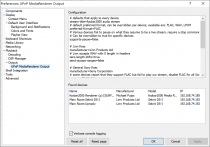Foobar2000:Preferences:UPnP MediaRenderer Output: Difference between revisions
(1.3 beta 5) |
No edit summary |
||
| Line 106: | Line 106: | ||
== Found devices == | == Found devices == | ||
Shows a list of | Shows a list of devices found on your current local network. Double click a device to see additional information about it. | ||
Double click a device to see additional information about it. | |||
Devices cannot be added manually - they're discovered using UPnP discovery protocol (SSDP). | |||
If your device is not detected, it's either not supported, or you've found a bug in the foobar2000 component; either way you're welcome to report it on the forum so it can be worked around. | |||
== Console logging == | == Console logging == | ||
Toggle this to enable verbose debug logging of all actions performed by the component, for troubleshooting. | Toggle this to enable verbose debug logging of all actions performed by the component, for troubleshooting. | ||
Latest revision as of 10:37, 10 June 2019

|
foobar2000 Preferences |
|---|---|
Deprecated pages Pages marked * are added via third-party components. | |
Summary
This page provides tweaking/troubleshooting options for the UPnP MediaRenderer Output component.
Configuration
Controls all settings of the component, including device-specific workarounds.
Sections
The options are grouped into sections, delimited by blank lines.
Each section contains options that apply to a specific range of devices.
A section may contain lines defining which devices it applies to: manufacturer, model and name.
For an example:
manufacturer=Sony Corporation
model=HT-XT3
.. means that this section applies only to device model "HT-XT3" by "Sony Corporation".
If you specify multiple manufacturer/model/name entries per section, the section will apply to each of the possible combinations.
Settings
stream-title
Controls the stream title sent to the device. Typically set in global settings. Can be overridden to sent different value to different devices.
preferred-format
Controls the preferred data format to be sent to the device. Valid values are: FLAC, LPCM and WAV. If the preferred format cannot be used (not supported by the device, or the requested bitdepth/channels are not supported), other formats will be attempted.
Note that WAV format doesn't support infinite length content without hacks and should be used only if there are no better alternatives; playback may stop abnormally after a few hours of playback due to this.
forced-format
If set, allows only one format to be streamed; an error message will be shown if the format is not compatible with the device - or with the requested sample rate / bit depth / channels combination.
Valid values are: FLAC, LPCM and WAV.
supports-FLAC
Set to 'false' to disable sending FLAC to this device, even if the device claims to support it. Some devices claim to support FLAC but fail to play a FLAC live stream or have other bugs affecting FLAC playback.
Note that you can only prevent FLAC from being sent, this setting will not cause FLAC to be sent to a device that doesn't claim to support it.
supports-WAV
Set to 'false' to disable sending WAV to this device, even if the device claims to support it. Some devices claim to support WAV but have bugs affecting WAV playback.
Note that you can only prevent WAV from being sent, this setting will not cause WAV to be sent to a device that doesn't claim to support it.
supports-LPCM
Set to 'false' to disable sending LPCM to this device, even if the device claims to support it. Some devices claim to support LPCM but have bugs affecting LPCM playback.
Note that you can only prevent LPCM from being sent, this setting will not cause LPCM to be sent to a device that doesn't claim to support it.
supports-pause
Set to 'false' to work around bugs related to pausing playback; a stop command will be sent to the device instead of pause.
zero-length-WAV
Some devices treat WAV files with zero length in headers as unknown-length and read them indefinitely, which is desired in this case. However this a hack and can't be used with every device out there. Known to work with Linn devices.
send-accept-ranges
Some devices dislike "accept-ranges: none" HTTP header, set this to 'false' to suppress this.
supports-infinite-length
Set to 'true' if the device supports infinite-length LPCM streams.
supports-chunked
Set to 'true' if the device supports HTTP chunked encoding.
hidden
Set to 'true' to hide matching devices from foobar2000 output device list.
bitdepth
Allowed values: 8, 16, 24, 32, 32fixed, 32float.
Overrides foobar2000's bit depth settings for this device.
bitdepth-max
Allowed values: 8, 16, 24, 32.
Specifies the device's maximum allowed bit depth.
dither
Overrides foobar2000's dither settings for this device.
Settings storage location
The above settings are stored in a file named foo_out_upnp-config.txt in your foobar2000 profile folder.
Found devices
Shows a list of devices found on your current local network. Double click a device to see additional information about it.
Devices cannot be added manually - they're discovered using UPnP discovery protocol (SSDP).
If your device is not detected, it's either not supported, or you've found a bug in the foobar2000 component; either way you're welcome to report it on the forum so it can be worked around.
Console logging
Toggle this to enable verbose debug logging of all actions performed by the component, for troubleshooting.

